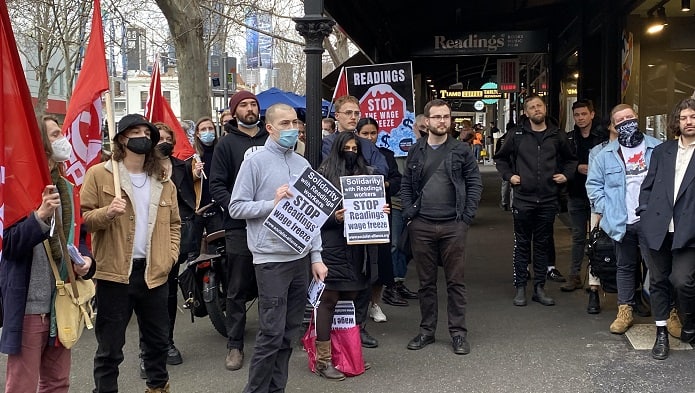Unionists have rallied twice outside Readings bookshop in the Melbourne suburb of Carlton to protest owner Mark Rubbo’s grubby decision to freeze wages for two years, which essentially means a real pay cut of up to 10 per cent over time.
Last month, Rubbo walked away from an enterprise agreement (EA) that Readings workers fought hard for, which included pay rises of 6.4 per cent per year. He backed out just before the deal was to be ratified by the Fair Work Commission (FWC).
While Rubbo claims he cannot afford wage increases after the two worst years in Readings’ history, he recently bought a multi-million dollar inner-city suite for his management team.
Dozens of rank-and-file unionists from the retail industry and workers from higher education and libraries attended the speak outs. They were organised by the retail workers’ union, RAFFWU.
Workers at Readings have been organising for at least five years, raising petitions against cuts to wages and conditions.
Persistence paid off and Readings was one of only a few retail workplaces where workers fought cuts to Sunday penalty rates and won.
This union history culminated in a breakthrough EA win, building on the success of Sydney bookshop workers at Better Read than Dead.
Clearer light
Solidarity spoke to Jack, a former Readings worker who was involved in organising the union.
“The experiences of working during pandemic lockdowns brought a lot of the difficulties of working at Readings into a clearer light.
“Some of those difficulties were related to the physical spaces we were expected to work in, the increases in our workload etc. And some were more systemic and longstanding—they were perhaps just made more apparent by the strain that lockdowns placed on us.
“One of the key things about the union movement at Readings is definitely that sense of wanting to improve things for every worker at Readings, with the hopes that whatever conditions we’re able to secure will then empower other workers to fight for those conditions in their workplaces.”
Jack added: “The success of Better Read Than Dead was definitely an important example of an instance where workers had organised, faced incredible resistance from a workplace, but ultimately managed to secure conditions that were better than most other bookstores, and perhaps most other retail workplaces full stop.
“In the warehouse where I worked there was a pretty high union density, so I and others perhaps felt a bit more empowered to speak about union matters on the job than say a worker in the shop may feel.
“Meetings during lockdowns had to happen on Zoom, but when we could we definitely favoured in person meetings, often at a pub or sometimes at union offices. We also communicated over a group chat which every union member had access to.
“Workers were pretty staunch in supporting each other when we were bullied or targeted by management, and there was definitely always a huge amount of concern from the broader union group when these things happened.
“We made the decision to go public through RAFFWU about two of the instances of bullying that myself and a colleague were subject to immediately following the first EA meeting.
“There was huge community support for us in addition to the support we were offering our fellow union members and this had the effect we were hoping for in that management very quickly stopped what they were doing.”
Dirty tricks
A message from Better Read than Dead unionists read out at the first rally reinforced that it is possible to fight against the dirty tricks of management and win.
The Readings EA, once ratified by the FWC, will be a step up on the Sydney deal as it covers eight workplaces rather than one.
A librarian from Moreland Council spoke in solidarity with Readings bookshop workers, pointing out that it is possible to coordinate industrial action across workplaces.
At the rally on Friday 19 August, RAFFWU Secretary Josh Cullinan told supporters that members would be voting on 23 August on protected industrial action.
Readings worker and union delegate Clare thanked people for their solidarity and told the crowd that management had finally made an offer, which members would consider following the vote.
The next solidarity rally is on Saturday 10 September, at 11am outside the Carlton store in Lygon Street.
By Steven Kwon






